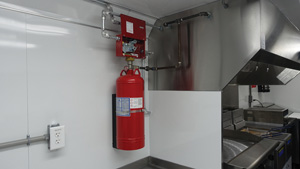Behind the scenes of food truck safety.
By Billy Findley
The food truck industry continues to grow at an astonishing rate — from a desperate, unemployed California chef in 2008 to a whopping $2.7 billion industry in 2017. But, food trucks can present challenges based on their size, location and type of truck. While most food trucks have a ‘DIY’ feel, the safety regulations behind-the-scenes are no ‘DIY’ venture to take lightly.
Unique Hazards
Food trucks come in all shapes and sizes and have unique layouts, but there is one common need: fire safety and suppression systems. In a food truck, fires can be much more detrimental than a typical restaurant due to the enclosed space and different types of risk factors. For example, food trucks typically have propane tanks, cooking sprays and oils, and high efficiency appliances — all of which are being jostled around by a gasoline-powered vehicle. From point A to point B, even sturdy, properly sealed containers can spill or start to leak in the truck, posing the possibility of explosive consequences — unbeknownst to the cooks. And, the gasoline tank on the truck can add literal fuel to any fire that gets out of hand. Last, unlike restaurants that have the kitchen separate from customers, there’s no hiding the food truck kitchen from those eager individuals ready to make their order. Should a fire spark, employees and customers alike could be badly injured.
Leveling the Playing Field
The rapid growth of food trucks has ushered concern from local governments, too. Food truck regulations may be lacking, but most states do require at least the same inspections and level of fire safety as they would for regular restaurants. And, many cities are beginning to implement food truck-specific codes and requirements — with some even requiring certain permits. Aurora, Illinois, a Chicago suburb, implemented regulations regarding its popular downtown food truck festival. Essentially, the regulations put food trucks on an even playing field with brick-and-mortar restaurants that pay fees and taxes. Officials must now inspect ventilation, storage and fire extinguishers in trucks. Additionally, Wisconsin requires food trucks to receive a permit to operate, and to be inspected by the city’s fire prevention and building safety staff before operating. As food trucks become more and more popular, city regulations are becoming stricter.
 The Solution
The Solution
The National Fire Protection Agency has indicated further development in codes for food trucks — including the implementation of NFPA 1, Section 50.7 last fall, offering the first fire safety code specifically aimed at mobile and/or temporary kitchens. This new code impacts many aspects of food trucks — from installation to inspection, maintenance and testing, installation of containers and storage, and use and transport of LP gases. This all-encompassing code will provide safety and security to food truck operators and customers, and create peace of mind for local governments.
Even with new codes, extra safety and a better understanding of fire safety and suppression systems, not every solution is one-size-fits-all. How can food truck operators protect their truck and patrons from a fire, and how can one effectively suppress it?
Custom Concessions, one of the world’s largest manufacturers of food trucks, is an ideal example of how food trucks can adapt to safety needs and regulations within the industry. For the food truck manufacturer that rolls out approximately 70 trucks a year all over the world, no two trucks are alike. From Texas Roadhouse to Dunkin Donuts, each requires different layouts and needs. The company estimates that 90% of its trucks require fire suppression systems, and the other 10% of trucks don’t use equipment commonly linked to fire hazards. The lack of food truck regulations hasn’t stopped Custom Concessions from ensuring all of its trucks still include appropriate grade fire extinguishers and fire suppression systems for their unique mobile kitchen challenges. Clients must submit jurisdiction, fire codes and all health codes of the local and state government they plan to operate in — before Custom Concessions even begins building their custom truck. With the help of a fire and life safety company, Custom Concessions makes this process seamless and efficient from day one to ensure safety and regulations are up to date and that everyone is adhering to developing NFPA codes.
Fire safety in food trucks isn’t only for the protection of the truck and its owners, but also its customers. By ensuring that regulations are up to date and meet the state and local requirements, food truck operators can focus less on potential fires and more on meeting the needs of customers — and their cravings.
— Billy Findley is vice president of general products at Koorsen Fire and Security. Founded in Indianapolis in 1946, Koorsen Fire & Security is a third-generation, family owned business that has become one of the largest and most respected fire and security companies in the United States with over 25 locations and nearly 1,100 associates. Koorsen Fire & Security is insured and certified to design, install, program, service and repair virtually all fire and security products for any size business. For more information, visit koorsen.com.
